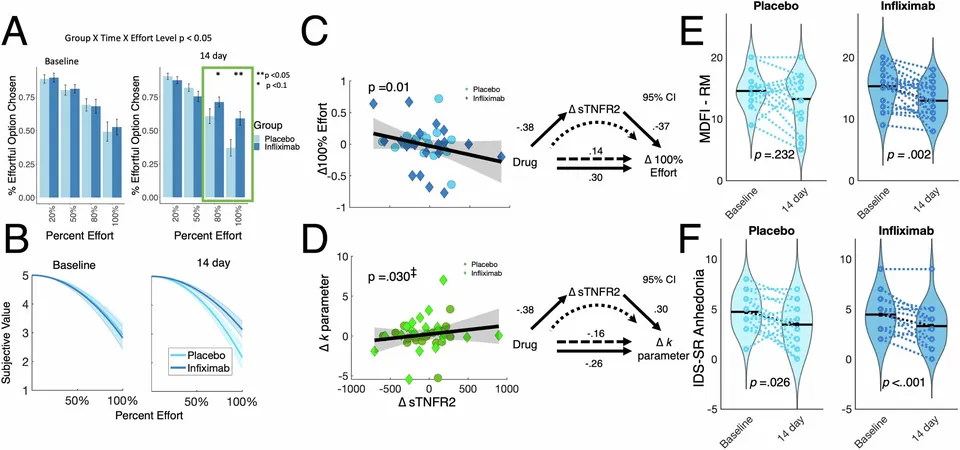
Breakthrough Study Reveals How an Anti-Inflammatory Drug Could Transform Depression Treatment
2024-09-23
Introduction
A groundbreaking study from Emory University published in *Molecular Psychiatry* has unveiled exciting prospects for treating motivation deficits in individuals grappling with depression. This critical research highlights how inflammation, often overlooked in mental health discussions, might be a significant barrier to recovery, especially in terms of motivating patients to engage in life-affirming activities.
Understanding the Role of Inflammation in Depression
Depression is widely known for its debilitating symptoms, but motivational impairments—a core aspect that severely impacts the quality of life—are particularly concerning as they contribute to poor treatment outcomes and an increased risk of suicide. The cause of these motivational challenges has increasingly been linked to chronic inflammation, which disrupts activity in vital brain circuits essential for motivation.
Study Design and Methodology
This study is the first ever to investigate the effects of infliximab, a medication traditionally used to treat rheumatoid arthritis and other inflammatory diseases, on the motivation levels of a specific group of 42 medically stable, unmedicated patients diagnosed with depression. What sets this research apart is its focus on individuals who present elevated inflammation levels, indicated by C-reactive protein (CRP) levels exceeding 3 mg/L—a straightforward blood test that healthcare providers can perform easily across the United States.
Results
The hypothesis was that the combined burden of depression and chronic inflammation might be particularly detrimental to motivation. To test this, participants were randomly assigned to receive either a single dose of infliximab or a placebo. Over the following two weeks, their motivation was assessed through various methods, including an effort-based decision-making task, self-reported questionnaires, and sophisticated technology like functional magnetic resonance imaging (fMRI) to visualize brain activity.
Findings
Notably, patients who received infliximab exhibited a marked increase in their willingness to exert effort toward obtaining rewards compared to those who received the placebo. This heightened motivation correlated with significant reductions in TNF (tumor necrosis factor) signaling pathways, which are specifically targeted by infliximab. Moreover, these behavioral changes reflected exciting shifts in brain activity, particularly in regions critical for motivation, such as the dorsomedial prefrontal cortex and the ventral striatum.
Expert Commentary
Leading the research, Dr. Michael Treadway emphasized the novelty of the findings, stating, "This is the first study to reveal the impact of an anti-inflammatory drug on brain circuits related to motivation. It's inspiring to see how modulating inflammation can directly influence motivation—one of the most challenging symptoms to treat in depression."
Implications for Future Treatment
The implications of this study are far-reaching. The relationship between infliximab treatment, improved motivation, and the observed brain activity changes suggest a hopeful new avenue for depression treatment. According to Dr. Andrew Miller, a senior author and expert in psychiatry, “These findings bolster our understanding that anti-inflammatory treatments could revolutionize how we approach motivational deficits in depression. By targeting inflammation, we address the biological roots of these challenges and open doors to more effective treatment strategies.”
Conclusion
As depression continues to affect millions worldwide, this research brings new hope, suggesting that innovative treatments that tackle inflammation could offer a lifeline for those struggling with the debilitating effects of low motivation. Could this study be the key to unlocking new, effective ways to combat depression? The potential for change is exciting, and the mental health community will undoubtedly be watching closely as further research unfolds.



 Brasil (PT)
Brasil (PT)
 Canada (EN)
Canada (EN)
 Chile (ES)
Chile (ES)
 España (ES)
España (ES)
 France (FR)
France (FR)
 Hong Kong (EN)
Hong Kong (EN)
 Italia (IT)
Italia (IT)
 日本 (JA)
日本 (JA)
 Magyarország (HU)
Magyarország (HU)
 Norge (NO)
Norge (NO)
 Polska (PL)
Polska (PL)
 Schweiz (DE)
Schweiz (DE)
 Singapore (EN)
Singapore (EN)
 Sverige (SV)
Sverige (SV)
 Suomi (FI)
Suomi (FI)
 Türkiye (TR)
Türkiye (TR)